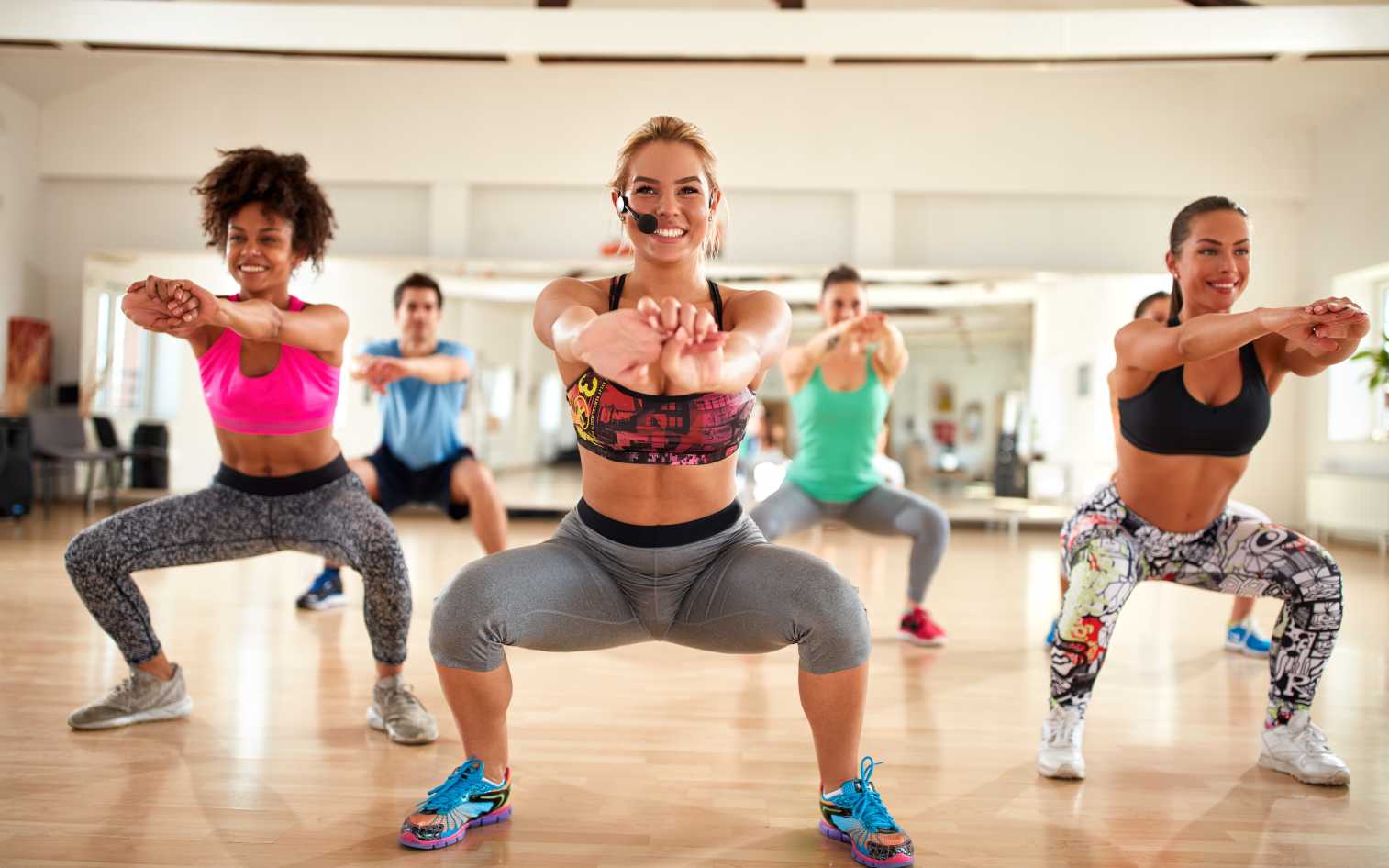
How to Become a Fitness Class Instructor (UK)
Everything you Need to Know on How to Become a Certified Group Fitness Instructor
Embarking on a journey to become a fitness class instructor can be both exhilarating and rewarding.
Whether you're passionate about helping others achieve their fitness goals or simply love leading dynamic workout sessions, this career path offers numerous opportunities for personal and professional growth.
In this guide, we’ll break down the steps you need to take to become a certified fitness class instructor (UK).
Why Become a Group Fitness Instructor?
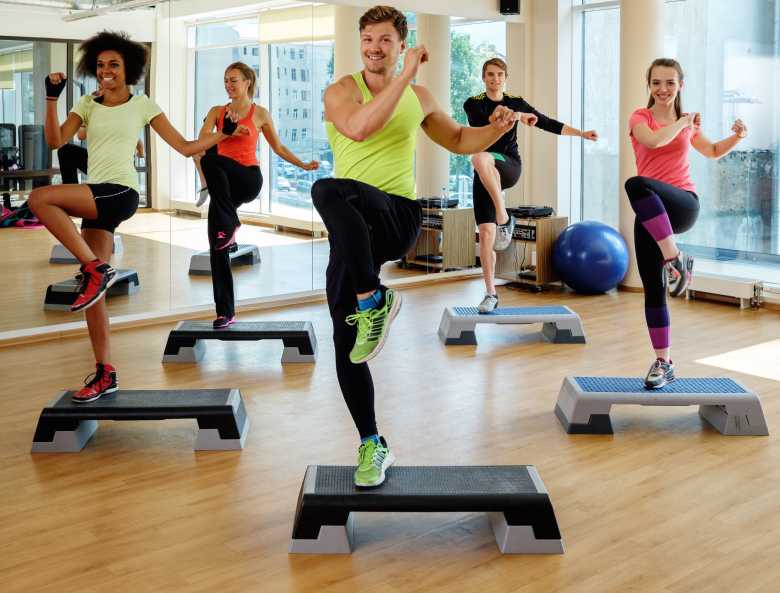
I have been a qualified group fitness instructor for close to two decades and this career path offers things that not many jobs can genuinely offer:
Social Job - You get to interact with a diverse range of people from all types of backgrounds and walks of life. It’s an immensely social and fun role and not just with clients but if you work in a gym with like minded staff too.
Be The Expert - As a good group fitness instructor you get to be the expert, the person people look up to and look for guidance from.
Help People - Becoming a gym class instructor is a positive way that you can really help people get into fitness, motivate people and help them start their health and fitness journey.
Rewarding - Nothing is more rewarding or satisfying than having a class attendee tell you how much you have helped them towards their goals or helped them overcome a hurdle in their life.
Flexibility - Depending which career route you choose, which we’ll discuss later in this article, you can pick the times you wish to work.
Earnings - You can charge what you like for a class and structure your class packages however you deem fit.
Active Job - It’s an active job that keeps you in both physical and mental good health.
What does a Group Instructor do?
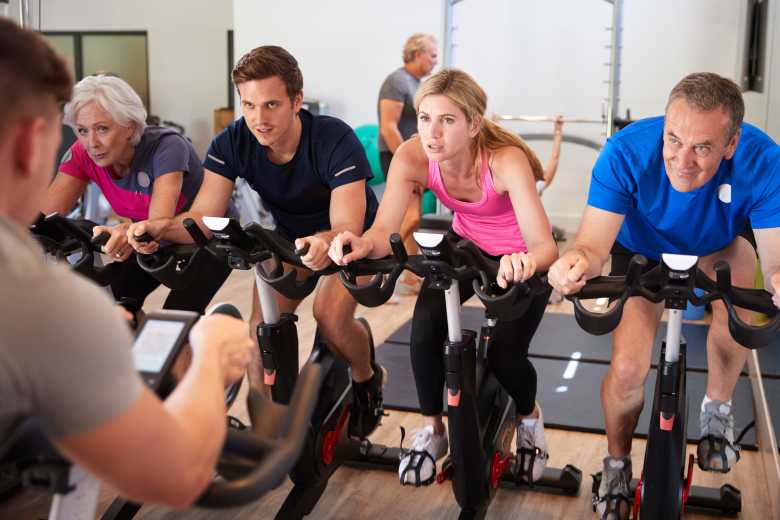
When thinking about how to become a fitness class instructor, you need to be aware of the core responsibilities and traits needed to be successful in such a position to ensure you’re aware of how the role matches your needs and expectations:
Core Responsibilities:
Motivated - Group Exercise Instructors must be warm, welcoming and maintain high energy levels to keep group participants motivated and engaged.
Supportive - A good group exercise instructor should be aware of class attendees that are struggling and help improve members that need it whilst sustaining the fluidity of the class as a whole.
Planning Classes - It is a group exercise instructor to formulate a cohesive plan of exercises for each respective class based on style of class, the goals of the class, the ability level it is targeted for, the class duration and even the choice of music.
Instruction and Demonstration - it is expected that for the majority of the class that the instructor first;ly demonstrates each respective exercise in a clear and concise manner, but also that the instructor participates in the class itself.
Time and Space Management - An understated skill is to make sure that the class is delivered in the time slot allowed and factors for attendees that need a little one to one support. Additionally, as class numbers can fluctuate, there is enough space for each exercise, especially when equipment is utilised as is critical for health and safety purposes.
Communication - You need to be confident in talking in front of groups and communicating in a constructive and know how to
Increasing Class Attendance and Retention - If it’s your own class business the number of class attendees you have will determine your overall success. You will need to promote and market your class to ensure a stable, re-occurring client base that you can depend on to bring in a regular income.
How Much Can You Earn as a Fitness Class Instructor?
This really depends on which route to market you elect to pursue, whether you decide to work as an employed fitness class instructor or opt to go down one of the plethora of freelance routes.
A gym, hotel or leisure Centre may pay their full-time employed staff £12-14 per class, yet can pay up to £35 outside of London and £45 per hour in London to a freelance instructor for classes that they can’t cover or if they don’t have a team member to deliver that style of class.
Additionally, a key thing to remember is that some classes require the group exercise instructor to hold specific qualifications or a more niche in discipline and therefore are difficult to recruit an instructor for, meaning you can charge more for that type of class delivery.
See some examples below of the classes that gyms typically pay independent freelancers more for:
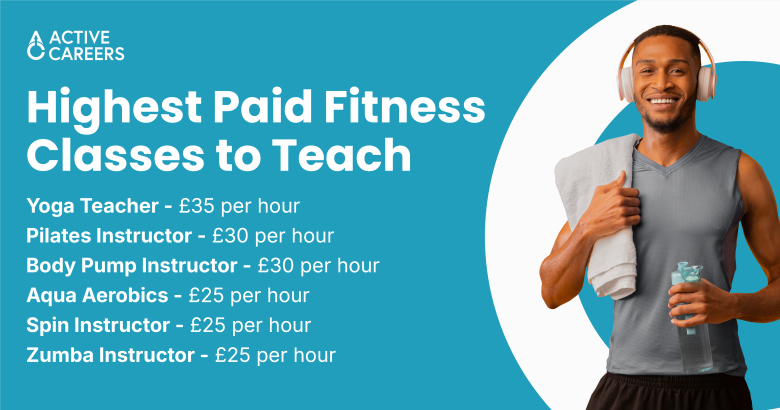
Naturally if you become a freelance fitness class instructor and run your own business you can charge class attendees as much or as little as you like.
You can adopt a pay as you go model, sell classes in blocks or adopt a subscription based model where you charge a monthly amount for them to be able to attend a fixed number of classes per month.
See an example below by Embrace Fitness in Manchester below, a class focused business run by qualified fitness instructor Ellie Downie:
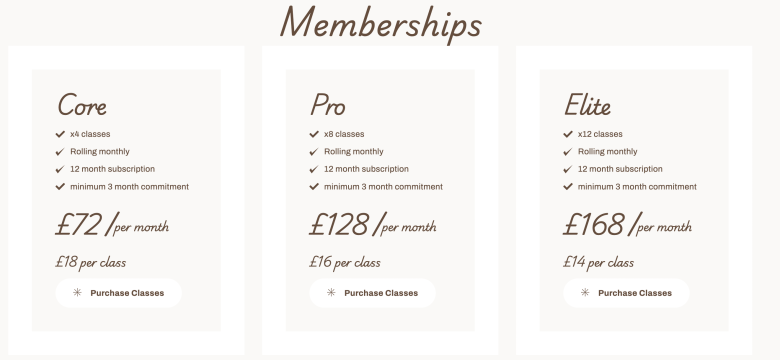
Some independent group fitness instructors that have built their class based businesses over a number of years and who have both a large number of regular attendees and classes on their timetable do earn well into the 6 figures, however this is when you become more of a brand and can employ staff to help you deliver sessions and can spend more time working on the business as opposed to in it.
According to our data, the average annual salary posted for a full-time fitness Instructor is £27,000 per annum (2024 data) and £22 is the average hourly rate for a freelance instructor.
What Qualifications are Needed to Become a Fitness Group Instructor?

In order to qualify as a group fitness instructor to lead classes, you must hold at minimum an Ofqual regulated Level 2 in Fitness Instructing qualification, also referred to as the Level 2 in Gym Instructing.
Ofqual is the vocational equivalent to Ofsted and is a government run regulator of all vocational based qualifications within the UK.
Ofqual standardises qualifications within the UK so that employers and the public know that individuals holding an Ofqual certificate have undergone the required level of training for their job role.
A compulsory module within all regulated Level 2 Fitness Instructing courses is a dedicated module on “Delivering Group Based Exercise” where you will learn how to communicate with large groups, how to plan a class and how to adapt classes for different ability levels and demographics.
Awarding organisations or governing bodies as they are also referred to, report to Ofqual and they are the ones that certify your qualifications and monitor training providers and colleges under their remit to make sure qualifications and training meet their quality standards and criteria.
The major awarding organisations within the health and fitness sector are:
Now it doesn’t matter which awarding body is printed on your certificates, however what does matter is which training provider or college you undertake the qualification with as this is where quality of resources differ, costs, locations, how it’s delivered and the level of support you receive, which varies greatly from provider to provider.
Enquire About OriGym's Ofqual & CIMSPA Recognised Level 2 Fitness Instructing Course
Active Careers has partnered with Fitness Training Provider of the Year 2024 OriGym for Level 2 Fitness Instructing Courses. Download their prospectus below.
How to Become a Group Fitness Instructor: Choosing The Right Course
There are a number of factors to consider when choosing which course will suit you best to make sure you get the most out of your course.
Accreditation
As we mentioned earlier you need to have an Ofqual regulated Level 2 certificate in Fitness Instructing but there is an additional accreditation to look out for….CIMSPA recognition.
CIMSPA stands for the Chartered Institute for the Management of Sport and Physical Activity and they are an independent organisation that help raise the standard of fitness professionals entering the sector.
Gyms, Leisure Centres, sport complexes and health clubs look for Class Instructors that hold CIMSPA accreditation. See below an excerpt from F45 Training’s jobs advert on our jobs board where you will see they are looking for class Instructors with CIMSPA recognised qualifications:
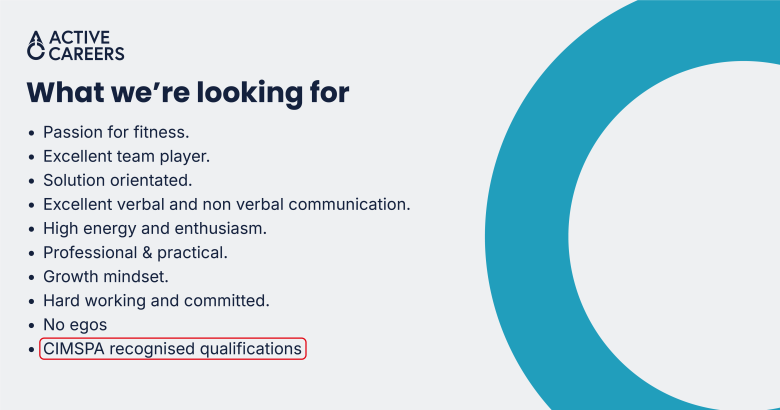
Most companies will advertise the CIMSPA's Partner logo on their website, however if you want to double check to see if a companies training is endorsed by CIMSPA you can search via their endorsed training directory here.
Performing your due diligence on accreditation is critical as if you buy the wrong course it could prevent you becoming a group fitness instructor entirely.
Delivery Style
When thinking about how to become a certified group fitness instructor you need to consider the learning style and how the course is actually delivered and whether that delivery style suits how you like to learn.
Here are the 4 most common delivery styles of qualifications:
Online - When you study via online learning, you will learn the course materials online via either or combination of videos, e-learning, ebooks, online lectures in accordance with distance learning support and then book in for your practical assessment at the end of the course.
Blended Learning - This learning style is where you will learn from the comfort of your home in combination with in-person learning that normally revolves around learning the practical implementation of being a fitness instructor. Providers can deliver the in-person sessions via workshops, mentoring sessions or in a classroom and gym based setting.
Part-time Classroom Learning - When becoming a fitness class instructor depending on the provider, you can study the course through fixed classroom learning that is normally set on either evenings or weekends that is spread over an 8-12 week period.
Intensive Learning - Intensive or full-time learning is traditionally executed in a group based setting where the course is delivered on a Monday to Friday basis where you will “intensely” study for a 2-3- week time period to obtain your qualification.
Location & Timing
One of the most important aspects to consider when becoming a certified group fitness instructor is where the course is based. It could tick all the boxes of being a great course but if the course itself is not logistically accessible it becomes a redundant process.
In combination with location is the timing that practical based sessions run, does this correlate well with your schedule and lifestyle?
You should also factor in travel costs and the price of convenience within your decision making.
Reviews, Social Proofing & Companies House Check

Like when you buy any high ticket product or service, you should always perform a background check on the companies you’re considering doing your course with.
The first and most obvious point of call is to check neutral review sites like Google and Trustpilot reviews to see what other people are saying about the course.
Don’t just look at the overall score, look at the percentage of 5 star reviews, percentage of 1 star reviews and also how many reviews the company has in total. This will give you a good picture of what the course, support and customer service is like.
Additionally, what most of us don’t do is a company's house check yet this is arguably even more important as it will tell you how financially secure the company is before handing over your hard earned money.
For example, in recent years, Premier Global NASM, Discovery Learning and Fit Learn have all gone bust in the UK, leaving thousands of students without a course and because they are limited companies, the students that bought courses from them have lost their money and their course. This is why a companies house check is paramountly important.
If you see a "First Gazette notice for compulsory strike-off", like the one screenshot below, which is taken from a real training provider's companies house page, your money might not be that secure as you think as this means they might be undergoing financial difficulties and maybe on route to being dissolved.

How Much Support Will You Get?

Some providers offer very cheap courses, but the help and support you will receive is next to nothing and if you run into a problem, it will be down to you to overcome.
You should find out how support is given, is it via email, phone, chat box, in-person or a combination of these. The more support
Another aspect that people overlook is when you get that support.
For example, if you're a distance learning student who works full-time you might need to get hold of a tutor on an evening or weekend as that’s when you’re studying. If their offices close on a weekend that can be a huge problem, thus you need to find out how accessible that support really is.
Licensed Classes: Extra Qualifications you Might Need to Become a Class Fitness Instructor
Licensed Classes are classes that are trademarked by a particular organisation so that they can sell the class structure to gyms, studios and leisure centres.
For example, you might be familiar with classes like Bodypump, BodyCombat or Body Balance? These are all licensed classes that are owned and trademarked by Les Mills.
In order to be qualified as a Les Mills Instructor to deliver these types of classes, once you have completed your Level 2 Fitness Instructing qualification you would need to complete Les Mills’ training for whichever class type you’re looking to teach, which at the time of writing costs £425 per class you wish to deliver.
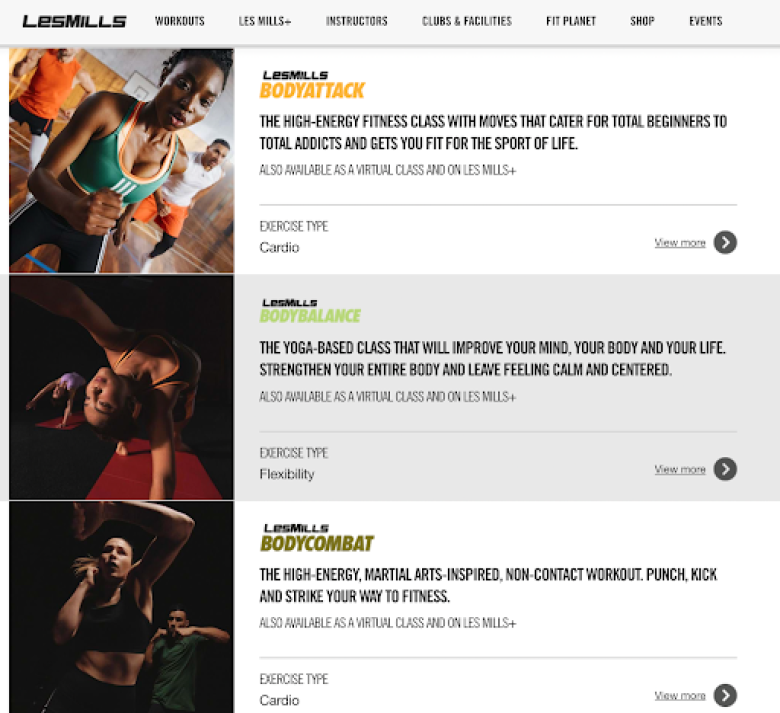
Other common licensed classes that require extra licensed qualifications are:
Spinning
Zumba
Boxercise
Jazzercize
Licensed classes are just trademarked variations of forms of training in class based structures. They are trademarking the routine, choreography and name but not the actual training style.
For example, bodypump is simply a toning class, but the routine, music and choreography within the class in coherence with the name is what Les Mills’ is trademarking.
If however you wanted to create your own toning class and choreography you can do, this would not be an infringement of trademark.
How to Become a Certified Group Fitness Instructor: Adding Class Specialisms

One thing to consider when thinking about how to become a gym class instructor is that when you undertake the Level 2 in Fitness Instructing that the course teaches you holistically how to manage, interact and run grouped based sessions, however it is not specialised to a particular discipline of class.
Undertaking additional training in the style of class you want to teach or deliver is strongly recommended and some classes have qualifications that are a mandatory requirement in order to run such a class.
The majority of classes actually don’t require a specific qualification, but there are qualifications out there called “CPDs” (Continuous professional development) which will help you deliver that particular type of class.
CPD courses are just short courses that enable instructors to learn how to deliver a particular type of class, how to adapt it for different age groups, demographics, ability levels, muscle groups and learn more movements associated to that particular discipline.
For example, I can run my own circuits class without any circuits specific qualification, but it would perhaps be beneficial if I had undergone a circuits CPD so that I know how to set-up a circuits class effectively, know how to adapt it to different ability levels and target certain body parts.
See a list of courses and class types below that you can run without the mandatory need for an extra qualification, yet naturally help you improve your craft and confidence of delivering that type of class:
Circuits Training CPD
Bootcamp Training CPD
Kettlebells CPD
Suspension Training CPD
Core Stability CPD
Boxing and pad work CPD
HIIT CPD
Bodyweight Training CPD
Now see below the type of classes that you might want to start teaching, that either are mandatory to have or strongly required by employers or insurance companies:
Yoga Classes
In order to teach yoga, you must complete at minimum the Level 3 Diploma in Yoga. The reason Yoga requires its own qualification, which can be taken without the need for the Level 2 in Fitness Instructing if that’s all you want to teach is because it is an all encompassing course that covers the essentials of the Fitness Instruction qualification within the course modules.
See below this job post by Unfurl Studios where they are requesting specifically a certified yoga instructor:
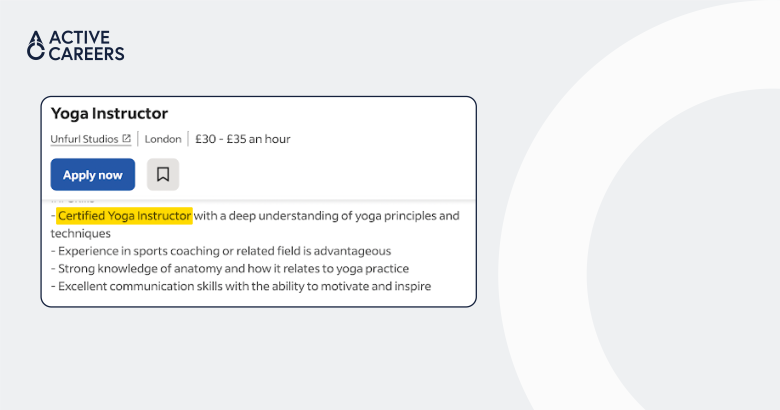
Pilates Classes
Pilates follows the same pattern as yoga in that in order to be employed at a pilates studio or gym as a pilates teacher, you need to hold a Level 3 diploma in Pilates.
See below this job posted by Trafford Leisure, who are looking for a Pilates Instructor and they require the Level 3 pilates qualification as a prerequisite requirement:
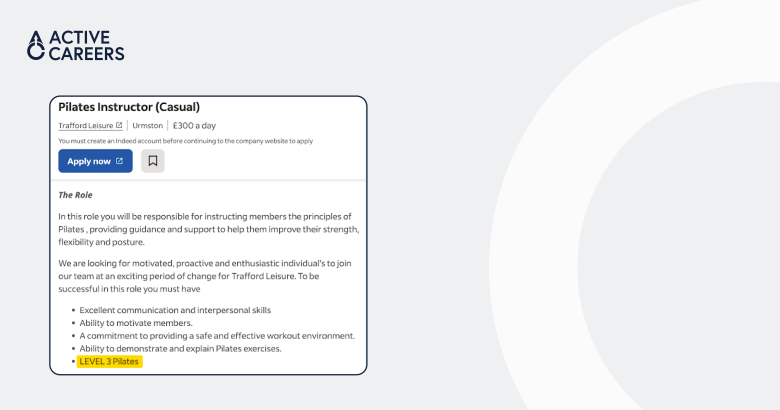
Water Aerobics
If you want to teach water aerobics at a Leisure Centre or gym based facility you do not have to hold a water aerobics based qualification. That said, some insurance companies could require that for your insurance to be valid to run that type of class that you do hold a CPD or a Level 2 in water aerobics due to the potential risks associated with running a class of that nature.
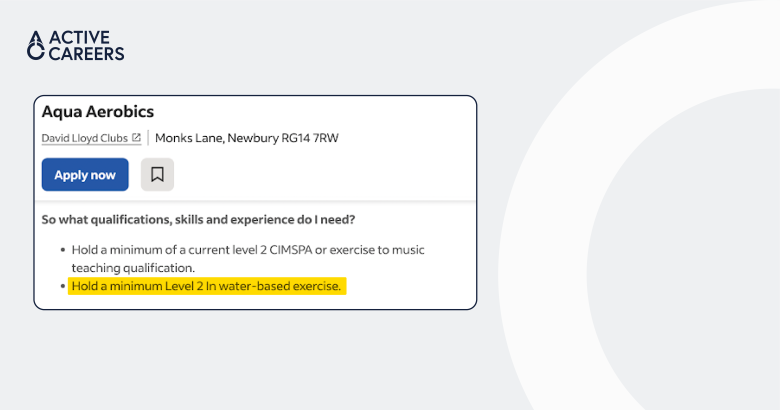
Indoor Cycling Classes
Most employers will require you to have a Level 2 indoor cycling or a spin qualification or the equivalent in order to run their indoor cycling classes. See this example by David Lloyds, where they are looking for a group cycling instructor and have specified that they require an accredited indoor cycling qualification:
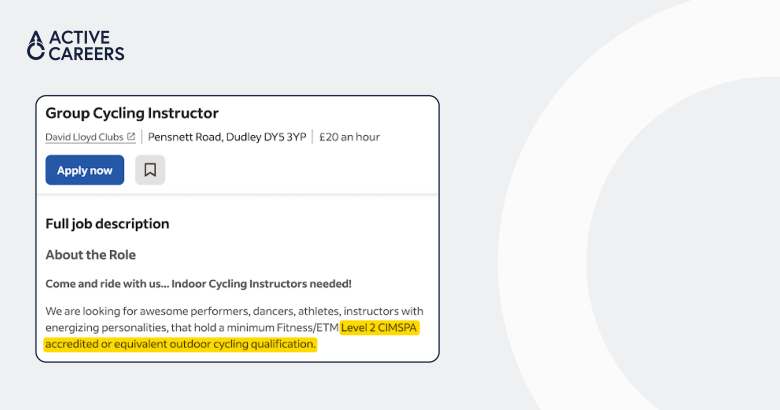
How to Become a Group Fitness Instructor: Career options to Consider

There are a few different routes you can take your career down major routes most fitness instructors choose when thinking how to become a fitness class instructor.
Work at a Studio or Gym
Most commercial based gyms offer a wide variety of fitness classes and thus need qualified fitness instructors in order to facilitate their timetable to their membership base.
There are even class only based gyms and studios where instructors' primary focus is to just deliver the classes under their remit on the timetable.
Most commercial based gyms merge the role of a class instructor between classes and gym instructor duties such as cleaning gym equipment, performing health checks and gym inductions.
Most roles within a large commercial gym tend to pay just over minimum wage with an annual salary of just over £25,000 outside of London, but you can find a more lucrative and stable income available by either working for a specialised studio or through delivering more niche, in-demand classes.
Online Fitness Classes
When becoming a certified fitness class instructor, you can set-up online fitness classes that members can benefit from via the comfort of their own home.
For example, you could create a website and charge individuals a subscription fee to access high quality pre-recorded classes that you can film at home or at a studio.
See an example here below from Fitness with Geri, who is offering unlimited online fitness classes from £70 per month:
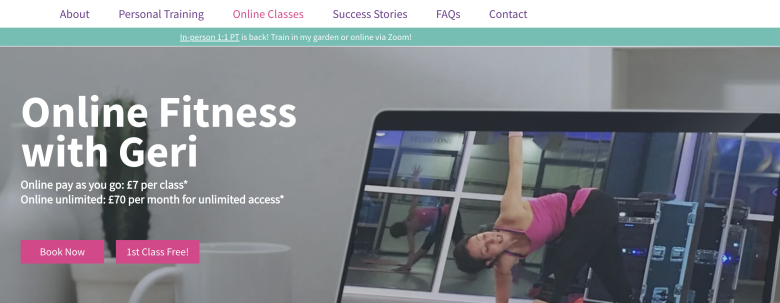
An alternative option is to livestream classes or you can even offer a hybrid solution, where some classes are pre-recorded and some are attended live.
Freelancing from Multiple Gyms & Studios
You can set-up as an independent class instructor and then work for multiple gyms and studios covering classes on their timetable.
You can approach gyms, sport complexes and Leisure Centres directly to ask them if they require cover or even find freelance class instructor jobs on major job sites like ourselves.
It is very typical for a freelance class instructor to start getting
Cruise Ships
When becoming a certified fitness instructor one option that you might not have thought about or even considered is working on a cruise ship or even a super yacht.
If you love the idea of traveling around the world and want to follow your passion for classes, then working on a cruise ship might be a viable option for you and it’s a great way to gain valuable experience, whilst having fun and making good money.
Do note, it can be long hours and you will need a valid passport and no criminal record as this can prevent you from entering certain countries.
Class Retreats
Class retreats have become big businesses in the UK, with people getting more health and fitness focused, so have their holiday choices.
This has led to the demand for class based instructors to increase and the opportunity to work as a group exercise instructor both in retreats domestically and abroad.
See here how Workout Away are promoting their up and coming retreats in both Marrakesh and Algarve, which requires specilised class instructors to deliver:

Progression Routes for Fitness Class Instructors
When thinking about how to become a group fitness class instructor (UK), it is a goo idea to plan ahead to where you want to take your career and get a good feel of what excites your aspirations and give yourself something to strive towards.
See below the most common progression routes that Fitness Class Instructors move into:
Class Coordinator
A class co-ordinator is an individual who determines the smooth operational running of the class timetable. They hire class instructors, orchestrate which classes run, how often and manage and report on attendance numbers back to senior management.
Studio Manager
Once you have gained teaching experience and industry specific know-how, you might want to progress up the managerial hierarchy and work as a studio manager.
A studio manager oversees the running of the entire studio including all the recruitment of fitness staff, the sales ,marketing and financial performance of the studio. They will also ensure the facility is well-maintained, customer service is exemplary and the facility is complaint with health and safety.
Personal Training
If you want to start offering one to one sessions you will need to gain your Level 3 in Personal Training. Personal Training is a natural stepping stone for many class instructors, which they can either combine with teaching classes as a supplementary form of income or venture into on its own merit.
Starting your Own Fitness Class Business
Once you have built up a client base of regular attendees, you can always set-up your very own class based business and either hire a hall, studio space or the equivalent to run your classes from.
Do Fitness Class Instructors Need Insurance?

It's crucial to understand that obtaining insurance is essential. Accidents can occur in any class setting, and having insurance ensures you have legal protection should someone file a claim against you.
When choosing insurance, it's important to select a reputable provider that offers comprehensive coverage, including public liability and indemnity insurance.
A reputable insurance provider will guide you based on your needs and business set-up to which policies you will need.
Professional negligence
If you get Injured or ill and are unable to work
If you Provide incorrect exercise guidance to clients
You can even get extra policies to protect you against damage to third party apparatus or your own gym equipment in case it gets damaged or stolen. This is particularly useful if you run your own class based business.
Become a Group Exercise Instructor: Hone Your Teaching Skills
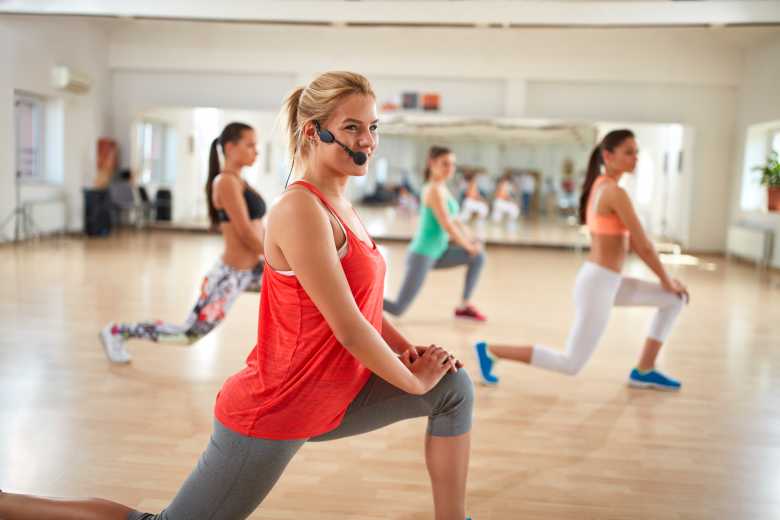
When becoming a group exercise instructor, like most things in life you need to hone your craft.
Being an effective instructor involves more than just possessing knowledge; it requires the ability to captivate and inspire your audience which comes from experience and practice.
Plan Your Classes: Carefully plan your classes to ensure they are well-rounded and engaging. Include warm-ups, main activity phases, cooldowns, and interactive elements. Keep the routines fresh to sustain interest and encourage ongoing participation.
Consistent Practice: Seek out as many teaching opportunities as possible. With each session, you’ll grow more adept at handling a crowd, knowing how to communicate with a large group and where to position yourself effectively.
Welcome Feedback: Encourage your peers, mentors, and even attendees to share their thoughts on your teaching. Constructive feedback can shine a light on both your strengths and areas needing improvement. Actively listen and adjust your methods accordingly.
Cultivate Your Distinctive Style: Every instructor brings a unique flair to their sessions, which can resonate differently with various groups. Try out different teaching techniques, music selections, and class structures to forge a truly personal approach. Authenticity helps build a real connection with your participants.

